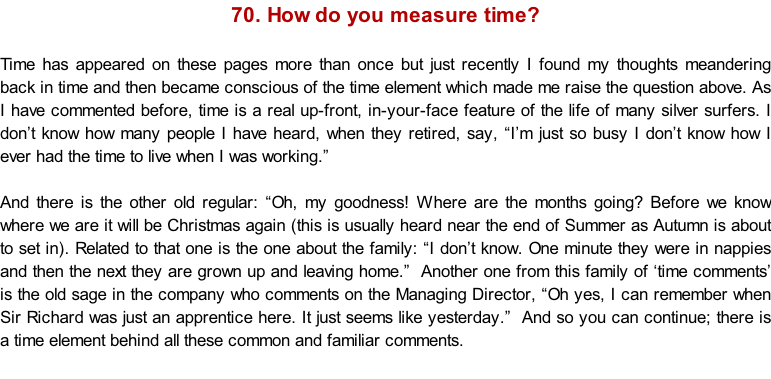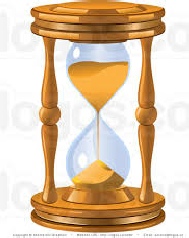








I have found that the more you think about it, the more you realise just how many times time crops up in life. For instance, if we are considering how important we think length of time is, a useful starting place for consideration is the crossing the Atlantic.
It is fascinating to look up the commercial sailing crossing times for the Atlantic, going back to 1830 when (for westbound sailings) it took fifteen days, down to 9 days by 1845, and five days by 1889 and eventually three days by 1939. (The pattern is similar but slightly longer for eastbound sailings.) In 1998, apparently, an ocean going powered catamaran did the crossing in 2 days 20 hours and 9 minutes. Oh, yes, even nine minutes is an important item when you are chasing time.
In 2016 the Daily Mail demonstrated admirably our fixation with speed and time by noting that a wave-
When it comes to flight, the Internet tells me that the record is 1 hour, 54 minutes and 56.4 seconds, by a Lockheed SR-
But if you want to get really picky about time you need to turn to the area of athletics. For most of us, we will instinctively think of Roger Banister being the first to run “the four-
So, let’s leave length of time behind and go on to the passing of time which is, I suspect, something of much greater relevance when we reflect on our lives and our past history. But before we go there, how about the whole concept of ‘life expectancy and feeling your age.’ If there is an area of modern life where we are complacent and take life for granted it is here.
National statistics tables declare, “Men and women aged 65 years could expect to live for an additional 18 to 20 years,” but you are as old as you feel. If we had been born in 1900 life expectancy was about 47 for a man and about 50 for a woman! We are definitely (on average) living longer but health problems and ailments (or the absence thereof) impact the reality of life. Ruefully I look back to twenty years ago and regret I took good health for granted, not that I am a wreck today, but with increasing age you do ache more and it isn’t just a joke, but conversations with others of like age, often drift to sharing anecdotes about operations!
But let’s focus on the passing of time and the question of the title of this article – how DO you measure time? Well if you want to be obvious or pedantic, the answer is, with a clock, but that’s not very helpful when you are trying to create a panorama of life. I think a more realistic means of assessment, when we are looking back, is to any specific topic of change. For example, inventions and changes in technology. Some of us would be better gauging the passing of time by remembering the coming of our favourite music, or plays or films or sports events. Who needs to ponder long to declare 1966 as the date when we last won the world cup at football. Perhaps we’ll do a follow-
When talking with someone about this subject they commented that there is a logical reason why, as you get older, time does seem to pass more quickly. Their take on this was that when you are five, one year is a fifth of your entire life, which is a lot, but when you are fifty, a year is only one fiftieth or 2% of your entire life which is not much. Therefore, they said, that later year seems to pass by much more quickly. I’m not sure of the logic of that; I think it is suspect. I think a better argument is that when you are five, your input into the world is very limited – family and school and some play. When you are fifty your input to the world has increased amazingly. You have family, friends, work, maybe a range of hobbies or similar activities, you may be involved in the community, and a range of such things. The simple truth is that in reality you ARE involved in a whole load more things than when you were younger, and your interests AND awareness of the world has increased dramatically so both your thoughts and your activities now vie to take space in your crowded mental and physical schedule.
To expand this into retirement, my friends who have commented on their busy-
Something else I have noticed is that time can be associated with emotional or ethical issues so, for instance, the police may be having difficulty apprehending local vandals. The local community get understandably stressed and days and weeks pass and time is now becoming an accelerator of stress. Or perhaps you are selling your house and it has gone on the market and someone has made an offer which you have accepted. Now you move into the stressful period where you want to buy another house and match the selling of yours with the buying of the new one. Suddenly slow solicitors or slow surveyors or slow bankers contribute to the level of stress and anxiety of your life. A vital virtue at this point is called patience. The ability to wait without stress while time passes is essential in modern life.
We had an example of this in what I will call our “Three experience”, and we’ll close with this true anecdote. The battery in my mobile was giving trouble and so as our provider is ‘Three’ we went into the Three shop in Southend, about the middle of the morning (although I don’t think that time played a factor in what followed). The young man, who basically did a good job throughout said, “Your battery needs replacing which will be £25 or you are due for an upgrade and can have a new phone.” I opted for the new phone. All done within five minutes after he got my information off the computer. Time did start frittering away when he laboriously started to fill in a long form by hand (don’t computers do away with paper?) but, hey we’re not in a rush. Then comes the loaded comment, “I just have to ring the upgrade through to Three,” and he taps out their number on his mobile and waits… and waits… and waits.. and retaps and waits… and waits. The fact that my wife was with me meant we were able hold a long conversation about things for which we needed to shop, where we might eat later… soon.. Now! Then we made holiday plans, talked about how to renovate our home and what was happening in the family (I exaggerate only slightly). The young man must know this is how long Three at the other end work – do they have just one operator working? Is it even in this country? This is, after all, about telecommunications!!!! It was probably twenty minutes, it might have been longer. Patience was a necessity. Time waiting for answers on a phone becomes significant and, if we let it, critical, it seems.
Well space has gone -
Learn to enjoy every minute of your life. Be happy now. Don't wait for something outside of yourself to make you happy in the future. Think how really precious is the time you have to spend, whether it's at work or with your family. Every minute should be enjoyed and savoured. Earl Nightingale
Change will not come if we wait for some other person or some other time. We are the ones we've been waiting for. We are the change that we seek. Barack Obama
Some of our important choices have a time line. If we delay a decision, the opportunity is gone forever. Sometimes our doubts keep us from making a choice that involves change. Thus an opportunity may be missed. James E. Faust
Time and space -
